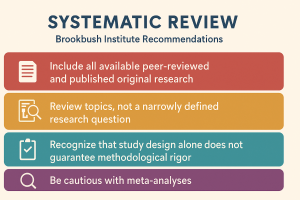The Brookbush Institute Publishes a NEW Glossary Term: 'Systematic Review'
The Brookbush Institute continues to enhance education with new courses, a modern glossary, an AI Tutor, and a client program generator.
Reviews should begin with a broad topic, allowing conclusions to emerge from the full body of evidence. This reduces the risk of hypothesis generation errors and confirmation bias.”
NEW YORK, NY, UNITED STATES, August 18, 2025 /EINPresswire.com/ -- - Excerpt from Glossary Term: Systematic Review— Dr. Brent Brookbush, CEO of Brookbush Institute
- Additional Glossary Term: Levels of Evidence
- Related Article: Meta-analysis Problems: Why do so many imply that nothing works?
DEFINITION:
Systematic Review (SR) is a rigorous, methodical, and transparent synthesis of research evidence on a specific question or topic. Unlike traditional narrative reviews, systematic reviews follow a predefined, replicable protocol to identify, appraise, and summarize all relevant studies, with the goal of minimizing bias and providing the most accurate and reliable answer possible.
KEY CHARACTERISTICS:
- Comprehensive and systematic search strategy
- Explicit inclusion and exclusion criteria
- Data extraction and, where possible, quantitative synthesis (meta-analysis)
- Transparent reporting of methods and results
HISTORICAL CONTEXT:
The systematic review framework emerged prominently in the 1970s and 1980s as researchers sought more objective, evidence-based approaches to summarizing medical literature. Organizations such as the Cochrane Collaboration helped formalize systematic review standards, which are now widely used in health sciences and other fields.
APPLIED EXAMPLE:
A systematic review might address whether progressive resistance training improves strength in older adults, including a systematic search of randomized controlled trials, risk-of-bias assessments, and, if feasible, a meta-analysis to pool effect sizes.
FREQUENTLY ASKED QUESTIONS (FAQs)
How is a systematic review different from a narrative review?
- A narrative review is more descriptive and often subjective, whereas a systematic review follows a structured, replicable methodology to minimize bias.
What is the difference between a systematic review and a meta-analysis (MA)?
- A systematic review is the broader process of collecting and synthesizing evidence; a meta-analysis is a statistical technique that may be included within a systematic review to combine numerical results.
Why are systematic reviews important?...
FOR THE FULL TEXT AND SO MUCH MORE, CLICK ON THE LINK
Brent Brookbush
Brookbush Institute
Support@BrookbushInstitute.com
Visit us on social media:
LinkedIn
Instagram
Facebook
YouTube
TikTok
X
Other
Legal Disclaimer:
EIN Presswire provides this news content "as is" without warranty of any kind. We do not accept any responsibility or liability for the accuracy, content, images, videos, licenses, completeness, legality, or reliability of the information contained in this article. If you have any complaints or copyright issues related to this article, kindly contact the author above.

